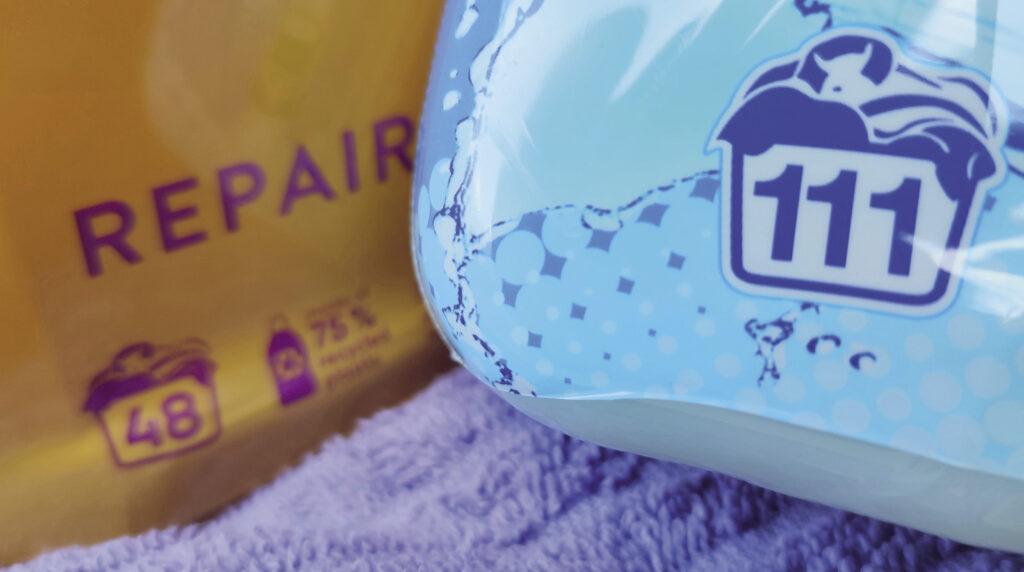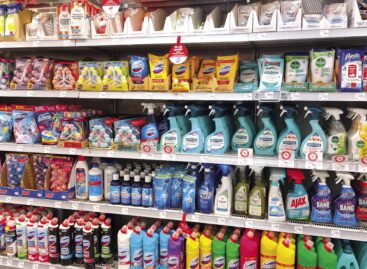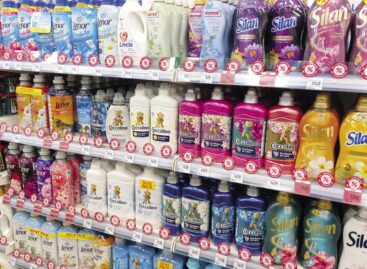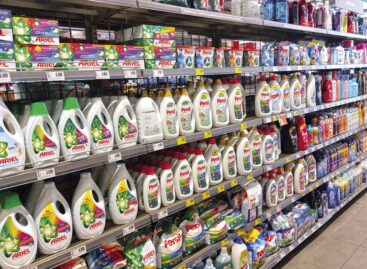Will there be a way out of the maze of unit prices?
In the past the only way to wash clothes was using some kind of washing powder. Once the category started expanding, shoppers gradually began buying liquid laundry detergents and laundry detergent capsules.
This was the time when the practice of indicating the unit price became problematic. The indications on different product formats – HUF/kg on washing powders, HUF/litre on liquid detergents and HUF/piece on gel capsules – practically made it impossible to compare the product categories. Today when everyone is trying to economise, it would be very important to know which type of washing is the most optimal for keeping costs low.
What KOZMOS thinks…

István Murányi
general secretary
KOZMOS
In 2021 the Hungarian Cosmetics and Household Chemicals Association (KOZMOS) commissioned a survey from Kantar, which revealed that Hungarian consumers like it best if laundry detergents are compared based on price/load of the different products, thus it has become necessary to transform the unit price indication in accordance with this.
István Murányi, general secretary of KOZMOS:
“EU laws make it mandatory to indicate the unit price of laundry detergents, but the regulation allows member states to decide which way they do this. We think that the Hungarian practice doesn’t make it possible for consumers to choose the best, most economical solution.”
The legislative side…

Dr. Nóra Kupecki
deputy state secretary
responsible for constitutional
legistlation and consumer protection
Ministry of Justice
Dr Nóra Kupecki, deputy state secretary responsible for constitutional legislation and consumer protection told our magazine: government decree 4/2009. (I. 30.) NFGM-SZMM regulates the indication of unit prices.
“From the perspective of informing consumers, it is essential to indicate both the product price and its unit price. With products sold based on weight, the rule is to display the HUF/kg, HUF/g, etc. price too. The law makes it clear that the same rules must apply for products in the same product group (e.g. those sold by weight); therefore there is no reason to have different rules for laundry detergents. Besides this, we don’t receive consumer requests for a different type of price indication in the shops. To me it isn’t clear in what ways the price indication recommended by KOZMOS is more accurate for consumers, e.g. the clothes of children who just got back from the playground are dirtier than the clothes an adult wears to work”
– said Dr Kupecki.
What do the manufacturers say?
Lots of manufactures and retailers back the changes recommended by KOZMOS.

Csilla Pásztor
senior brand manager
Henkel Magyarország
Csilla Pásztor, senior brand manager of Henkel Magyarország Kft.:
“Hungarian shoppers can choose from a large number of laundry detergent brands in several formats (gel, powder, capsule), and there can be significant difference between these in the quantity that the manufacturer recommends to be used per load. The price tags on store shelves still feature the price/litre and price/kg instead of the price/load, which makes it impossible to decide which product offers a better deal. There is an economic recession and it would be crucial to help shoppers make the best buying decisions.”
Anita Nagy, brand manager of Unilever Magyarország Kft.:

Anita Nagy
brand manager
Unilever Magyarország
“Right now it is very difficult to define a unit price that would facilitate price comparison for consumers. Even in the same laundry detergent format, sometimes different manufacturers recommend different quantities to be used for a single load. Indicating the price/load would make the market more realistic, and it would also be better from a sustainability perspective, because by knowing how much an actual wash costs, consumers would be more motivated not to use too much laundry detergent. Shoppers can already find the number of loads the given detergent is enough for on the packaging of our products.”
What do the retailers say?
The retailers our magazine contacted are also in favour of the changed that KOZMOS recommended.

Márk Maczelka
head of communications
SPAR Magyarország
Márk Maczelka, head of communications at SPAR Magyarország Kereskedelmi Kft. told that they do what is required by the law, but they reckon it would be a good idea to change how unit prices are indicated, as shoppers would see the cost difference better when using washing powder, gel or pod.

Tamás Horváth
senior purchasing manager
Rossmann Magyarország
Tamás Horváth, senior purchasing manager of Rossmann Magyarország Kft.:
“The new type of price indication would create no difficulty for us, but it would be very important to designate a transitional period when we use both types of unit price, before only the price/load appears on products. So far we haven’t received feedback from consumers that they demand this type of price communication, but once they show such demand we will study its possible implementation at both store and chain level. Rossmann stores in Germany already indicate the unit price in washing load (WL). My view is that it would trigger a restructuring in the category if we indicated the unit price differently.”

Indicating the number of loads would be more practical for consumers with tight budgets striving to save money
Anita Oláh, assortment manager of dm Kft.:

Anita Oláh
assortment manager
dm
“It really matters how much water and how much active ingredient one litre of product contains. I totally agree with what KOZMOS recommends. Indicating the price/load would be much more practical for shoppers to decide whether a product’s price-value ratio is good or not. In the German and Austrian dm online shops laundry detergent prices are already indicated in washing load number.” //
This article is available for reading in Trade magazin 2023.2-3.
Related news
Cleaner than clean
🎧 Hallgasd a cikket: Lejátszás Szünet Folytatás Leállítás Nyelv: Auto…
Read more >Short wash cycle, long-lasting effect
🎧 Hallgasd a cikket: Lejátszás Szünet Folytatás Leállítás Nyelv: Auto…
Read more >Related news
ZEW: Economic expectations worsened in Germany and the euro area in February
🎧 Hallgasd a cikket: Lejátszás Szünet Folytatás Leállítás Nyelv: Auto…
Read more >NKFH: inspections focus on discount prices and customer deception
🎧 Hallgasd a cikket: Lejátszás Szünet Folytatás Leállítás Nyelv: Auto…
Read more >








